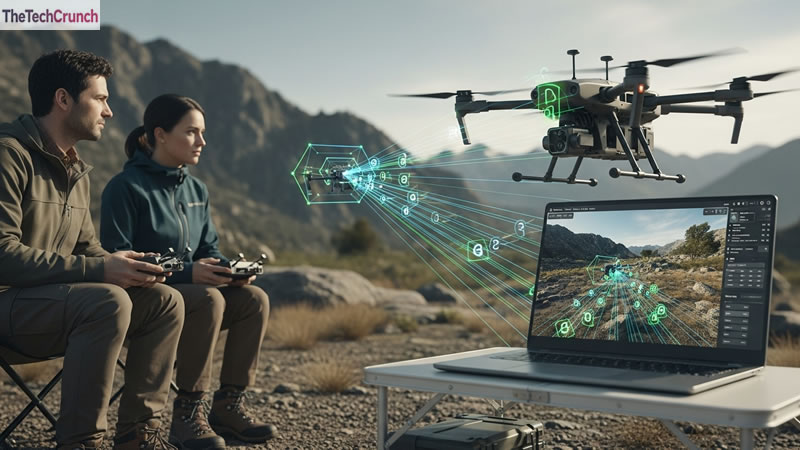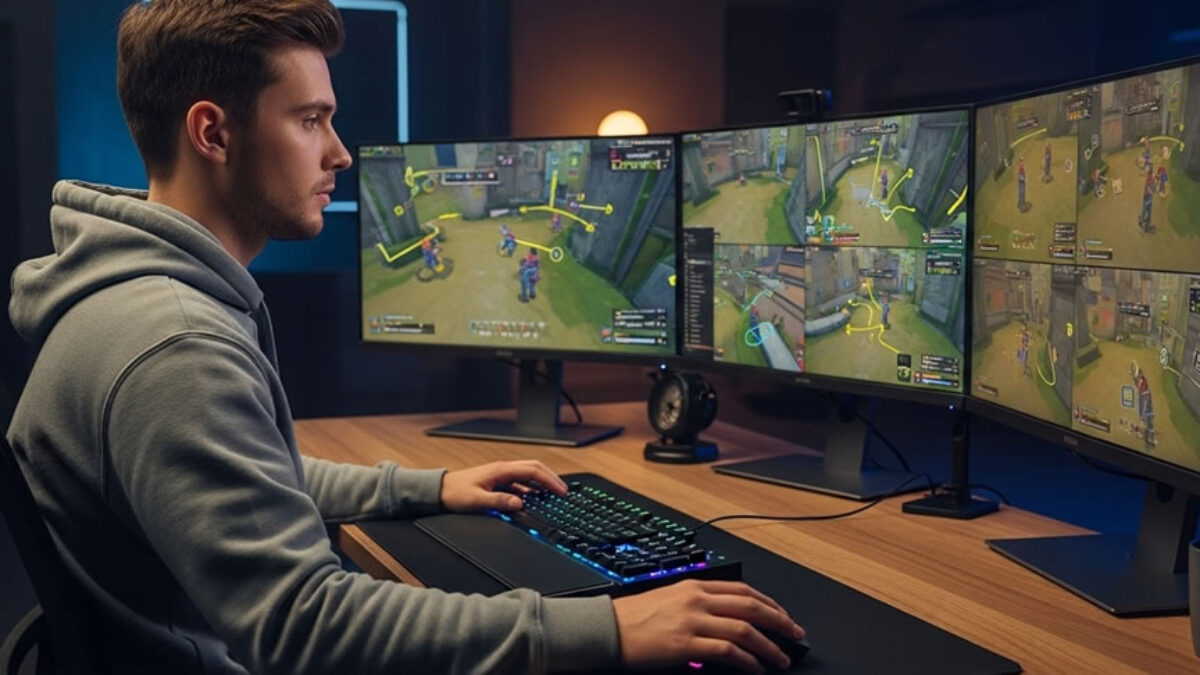In the rapidly evolving world of artificial intelligence, a new player has emerged with a unique vision that could reshape how machines understand and interact with the world. General Intuition AI, a spinoff from the popular video game clip-sharing platform Medal, is taking a groundbreaking approach to training intelligent agents.
By leveraging millions of gaming videos, the company is developing foundation models and AI agents capable of understanding how objects and entities move through space and time. A concept known as spatial-temporal reasoning.
The Origin of General Intuition AI
General Intuition AI was founded out of Medal. A platform where gamers upload and share billions of gameplay clips every year. Recognizing the immense potential of this vast dataset, Medal’s CEO, Pim de Witte, launched General Intuition to focus specifically on advancing AI research.
The company’s mission is to use real gameplay footage to train artificial intelligence models that can perceive and react to environments the way humans do. Medal’s massive data pool is its competitive advantage. With over 10 million monthly active users and nearly 2 billion videos uploaded per year. It offers one of the most diverse and dynamic video datasets available.
Stay up to date with the latest technology in TheTechCrunch. This covers artificial intelligence, mobile and web apps, modern things, cybersecurity, and general technical news. From AI’s successes to chat and generative tools. Such as smartphones, laptops, and wearables’ special reviews. TheTechCrunch gives an insight into this case.
Unlike traditional datasets that rely on scripted or static video. Medal’s content is generated from thousands of games, each with different environments, mechanics, and player interactions. This variety provides General Intuition AI with the perfect foundation for developing models that can generalize across different settings.
Why Gaming Data is Ideal for AI Training
When gamers play, they constantly interpret changing environments, make split-second decisions, and navigate unpredictable situations. These interactions are exactly what AI needs to learn real-world reasoning. According to Pim de Witte, gamers often upload clips that capture extreme or emotional moments, either remarkable successes or unexpected failures.

These moments, which highlight edge cases, are invaluable for training AI models that need to handle complex, real-world scenarios. Unlike video data from platforms like YouTube or Twitch, Medal’s clips are short, action-packed, and human-curated.
This allows General Intuition AI to train agents that can interpret sequences of actions, predict outcomes, and respond dynamically to new inputs. Essentially, gaming videos simulate real-life experiences in controlled digital environments, giving AI a safe yet realistic space to learn.
The Science Behind Spatial-Temporal Reasoning
Spatial-temporal reasoning refers to an AI’s ability to understand how things move and change over time within a space. It’s a skill humans use every day — from predicting where a ball will land to navigating traffic. For AI, mastering this concept is critical for applications in robotics, drones, and autonomous vehicles.
General Intuition AI’s models learn these patterns purely from visual input. Agents only see what a human player would see on the screen and learn to move through virtual worlds using simulated controller inputs. This mirrors how humans interact with their surroundings, bridging the gap between digital learning and physical understanding.
Massive Funding and Industry Attention
General Intuition AI’s innovative approach has attracted enormous attention and investment. The company raised $133.7 million in seed funding. Led by Khosla Ventures and General Catalyst, with participation from Raine and other major investors. This strong financial backing reflects growing confidence in the startup’s potential to lead the next wave of artificial intelligence innovation.
The company’s technology has also caught the eye of major AI players. Reports indicate that OpenAI attempted to acquire Medal for $500 million in late 2023, a sign of how valuable this gaming data and research direction are. While the acquisition did not happen, it highlighted the strategic significance of General Intuition AI’s dataset and its long-term potential.
Beyond Gaming: Real-World Applications
While General Intuition AI is deeply rooted in gaming, its applications go far beyond entertainment. The company is already working on training AI agents for search and rescue drones that can navigate unfamiliar environments without GPS. These drones rely on visual cues just like game characters to move and make decisions in real time.
Another exciting application is in robotics. Because the AI learns how to move and interact within virtual environments, the same intelligence can be transferred to robotic arms, autonomous vehicles, or industrial machines. This transferability makes General Intuition’s models highly adaptable, capable of bridging the gap between digital simulation and physical action.
Redefining AI Agents in Gaming
In the gaming industry itself, General Intuition AI is working to create smarter and more adaptive non-player characters (NPCs) and bots. Traditional game bots operate on fixed programming, producing the same predictable responses. In contrast, AI-powered agents developed by General Intuition can learn and adapt, offering a dynamic gameplay experience.
These AI agents can adjust their difficulty levels based on player performance, ensuring balanced competition and longer player engagement. Instead of creating unbeatable “god bots,” General Intuition focuses on maintaining a 50%-win rate. This keeps players motivated and entertained without frustration. This innovation could transform online multiplayer games by filling lobbies with intelligent bots that mimic human-like behavior, improving matchmaking and retention.
Ethical Development and Avoiding Copyright Conflicts
Unlike other AI labs building world models for content generation, General Intuition AI is not focused on producing visuals or games themselves. Instead, it uses world models as a training environment for its agents. This approach helps the company steer clear of copyright issues that have challenged other AI startups.
Explore a complete hub for the latest apps. Smart things and security updates online. Ranging from AI-operated solutions and automation tools. TheTechCrunch offers in-depth articles, comparisons. And specialist analysis is designed to understand the rapidly changing technology. Whether you are keen on robotics, data protection, or the latest digital trends.
According to de Witte, the goal is not to compete with game developers but to enhance digital. And real-world experiences by making AI more perceptive and intuitive. The company’s ethical stance ensures that its research contributes positively to both the gaming and AI ecosystems.
The Path Toward Artificial General Intelligence
Ultimately, General Intuition AI’s research aligns with the broader quest for Artificial General Intelligence (AGI) AI that can reason, learn, and interact like a human across multiple domains. While many companies focus on large language models that understand and generate text, General Intuition believes that real AGI requires understanding physical reality.

Text-based models, no matter how advanced, lack the sensory experience of space and motion. As Pim de Witte explains, humans describe the world with words, but in doing so, they lose a great deal of context and intuition. General Intuition AI aims to fill that gap by giving machines the ability to reason visually and spatially just like humans do.
Conclusion
General Intuition AI represents a new frontier in artificial intelligence research. By turning billions of gaming moments into a massive learning laboratory, the company is developing systems that can truly understand movement, perception, and interaction.
Its focus on spatial-temporal reasoning sets it apart from traditional AI research and positions it at the forefront of the next generation of intelligent systems. As it continues to grow and refine its models, General Intuition AI could very well be paving the road toward a future where machines not only think. But also perceive and act with true human-like intuition.
Here Are More Helpful Articles You Can Explore On TheTechCrunch:
- Pinterest AI Slop: How the Platform Is Tackling the Surge of AI-Generated Content
- Spotify SongDNA: Explore Who Makes Your Music
- Best AI Automation Tools for Small Business Growth
- Google Search and Discover Updates 2025
- Spotify Managed Accounts: A New Way for Parents to Control What Their Kids Listen To
- Oura Smart Ring: How the Tiny Wearable Is Redefining Health Tracking


